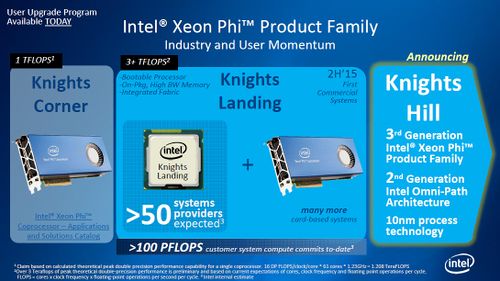From WikiChip
Knights Hill - Microarchitectures - Intel
| Edit Values | |
| Knights Hill µarch | |
| General Info | |
| Arch Type | CPU |
| Designer | Intel |
| Manufacturer | Intel |
| Process | 10 nm |
| Pipeline | |
| Type | Superscalar |
| OoOE | Yes |
| Speculative | Yes |
| Reg Renaming | Yes |
| Instructions | |
| ISA | x86-16, x86-32, x86-64 |
| Succession | |
Knights Hill (KNH) was Intel's planned successor to Knights Landing, a 10 nm many-core microarchitecture for research and supercomputers.
Contents
History
Announced in 2014, Knights Hill was originally planned to be delivered in 2016 and be manufactured on a 10 nm process. The architecture was also planned to power a number of supercomputers, including the United States highest-performance supercomputer, Aurora. Delays with 10 nm has pushed the product back to 2017. Eventually, in November 2017 Intel announced that Knights Hill would be cancelled:
One step we’re taking is to replace one of the future Intel® Xeon Phi™ processors (code name Knights Hill) with a new platform and new microarchitecture specifically designed for exascale.
Brands
Knights Hill was branded as 3rd generation Xeon Phi
Process Technology
Knights Hill was intended to be fabricated on Intel's 10 nm process.
Architecture
Intel released very few architectural details regarding Knights Hill.
Key changes from Knights Landing
- 10 nm (from 14 nm)
- 2nd Generation Omni-Path Architecture
References
- Unleashing High-Performance Computing Today and Tomorrow, November 13, 2017
Facts about "Knights Hill - Microarchitectures - Intel"
| codename | Knights Hill + |
| designer | Intel + |
| full page name | intel/microarchitectures/knights hill + |
| instance of | microarchitecture + |
| instruction set architecture | x86-16 +, x86-32 + and x86-64 + |
| manufacturer | Intel + |
| microarchitecture type | CPU + |
| name | Knights Hill + |
| process | 10 nm (0.01 μm, 1.0e-5 mm) + |
